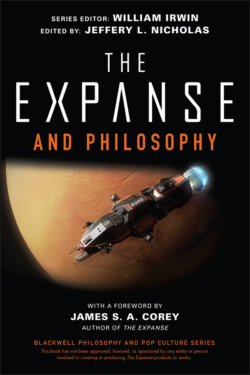Читать книгу The Expanse and Philosophy - Группа авторов - Страница 31
3 Humanity’s Dilemma before Abaddon’s Gate
ОглавлениеLeonard Kahn
James Holden manages to convince an alien technology—Abaddon’s Gate, created by the protomolecule—that human beings are not a threat. It opens up 1,300 Einstein‐Rosen bridges, providing humanity access to at least as many habitable worlds. Humanity faces a dilemma at the start of the fourth season of The Expanse. How should we proceed? Should we use the Ring System to explore and colonize the galaxy, even though trying to do so might kill us all?
Throughout the season, UN Secretary General Chrisjen Avasarala and her political rival, Nancy Gao, debate this question. While Avasarala advocates a slow, cautious approach, Gao champions immediate and aggressive exploration and colonization.
NANCY GAO:
“Whatever is out there, we’ll deal with it because that is the history of our species.”
CHRISJEN AVASARALA:
“Right up to the moment that our species ceases to exist.” (“Subduction”)
By the end of the season, Gao has won the debate. She replaces Avasarala as Secretary General and appears poised to begin what James Holden fears will be a “blood‐soaked gold rush” (“Abaddon’s Gate”).
But we can ask, who should have won the debate?
Gao’s reasons for favoring a rapid and forceful approach to colonization are rooted in Earth’s dire circumstances. Centuries before the series begins, humans have damaged Earth’s ecosystem. As a result, about half of its 30 billion inhabitants live on Basic Assistance, a welfare program that provides just the minimum needed to survive. The only way to break free from Basic Assistance is to get a job or training, and competition for these escape routes is so fierce that only 1 in 6,000 people manages to do so. Nico (a man whom we briefly meet in “Cascade”) admits to Bobbie Draper that he has been waiting for a spot on the vocational training list for 35 years. Gao herself was able to escape Basic Assistance only because a well‐connected family friend interceded, a fact that Avasarala gleefully threw in her face. As Gao put it, “the system is broken,” and the way to fix it is to allow Earth’s inhabitants to use the Ring System to explore the hundreds of new worlds available to them (“Oppressor”).
Yet the alien technology, the protomolecule, responsible for opening Abaddon’s Gate is dangerous. Experimentation with it caused the Eros Incident, which almost killed everyone on Earth. Even after the opening of Abaddon’s Gate, the protomolecule was on the verge of wiping out the entire solar system because it saw humanity as a threat. The protomolecule is dangerous, so we need to consider both the benefits and the costs of using the Ring System.
How effective is this response to Gao’s reasoning?
The answer depends. In part, we have to know whether Gao counted the benefits correctly. Providing better opportunities for 15 billion people would be wonderful, of course. Yet doing so pales in comparison with other benefits that utilizing the Ring System could have. Gao’s reasoning becomes much stronger if we consider the future, rather than just the present, effects of using the Ring System.
Looking at the other advantages means imagining the ends of our potential as a species.
